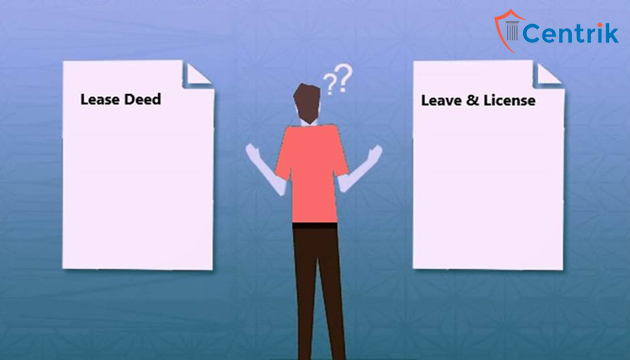
Status as on- 20/05/2023
A lease is a transfer of the right to enjoy the concerned property for a pre-defined time period or in perpetuity. It is defined under section 105 of the Transfer of Property Act. In a lease, the actual possession is transferred to the lessee. It creates interest on the leased property in favor of the lessee.
A leave and license agreement is a legal document that enables one party to allow another party to use their immovable assets, i.e. property, for a specific period without any change in the ownership of the asset. It does not create any interest in favor of the other. Leave and license agreements are commonly used among landlords and tenants in India, especially in the rental housing segment. It is defined in Section 52 of the Indian Easements Act, of 1882.
Thus, the primary distinction between a lease and a license is that the lease is a transfer of a right in a specific immovable property, whereas, the license is a bare permission to enjoy the property for a specified period of time.
Points of difference-
- A lease is transferable and heritable whereas a leave and license is neither heritable nor transferable.
- Lease agreement gives the power to alter or construct but a license doesn’t give the power to alter or construct unless specified.
- A lease agreement is irrevocable by the landlord as the lessee has actual possession of the property. While, under a leave and license agreement, the licensor has the authority to revoke the agreement against the interest of the licensee.
- Death of either of the parties, i.e. lessee or lessor doesn’t affect the lease agreement as it is heritable but in case of leave and license, the license is terminated in the event of death of either of the parties.
- A lease creates an interest in the property whereas a license does not create any sort of interest in the property.
- A lease deed needs to be stamped and registered. The amount payable towards the lease deed’s stamp duty is more than that payable towards the Leave and license. The stamp duty is the same for both agreements for a period exceeding three years.
- A lease is unaffected by the transfer of the property by sale in favor of a third party. It continues and the purchaser has to wait till the time period for which the tenancy was created is over before he can get possession, whereas, in the case of a license, if the property is sold to a third party, it comes to an end immediately.
To sum up the above-discussed points, it can be said that a lease deed is of a much more permanent nature that is perpetual and transferable. It creates an interest of the immovable property in favor of the lessee and grants an ownership title as well. On the other hand, a leave and license agreement is more commonly seen in cases where rent is paid against the enjoyment rights over the property, and no interest in the property is created in favor of the licensee.
Disclaimer: The above article is based on the personal interpretation of the related orders and laws. The readers are expected to take expert opinions before relying upon the article. For more information, please contact us at ibc@centrik.in.




 join For Updates
join For Updates